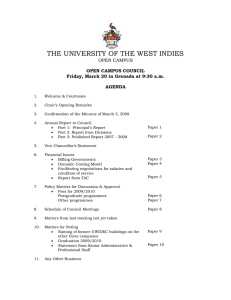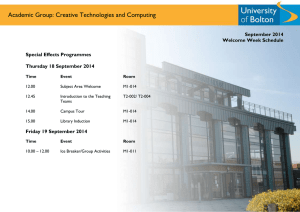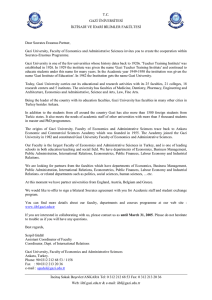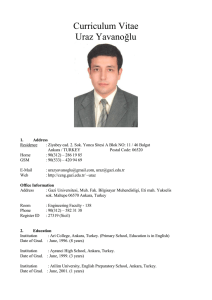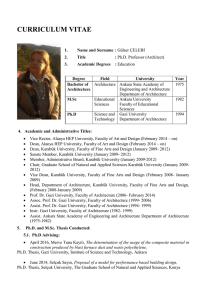Profile of Gazi University
advertisement
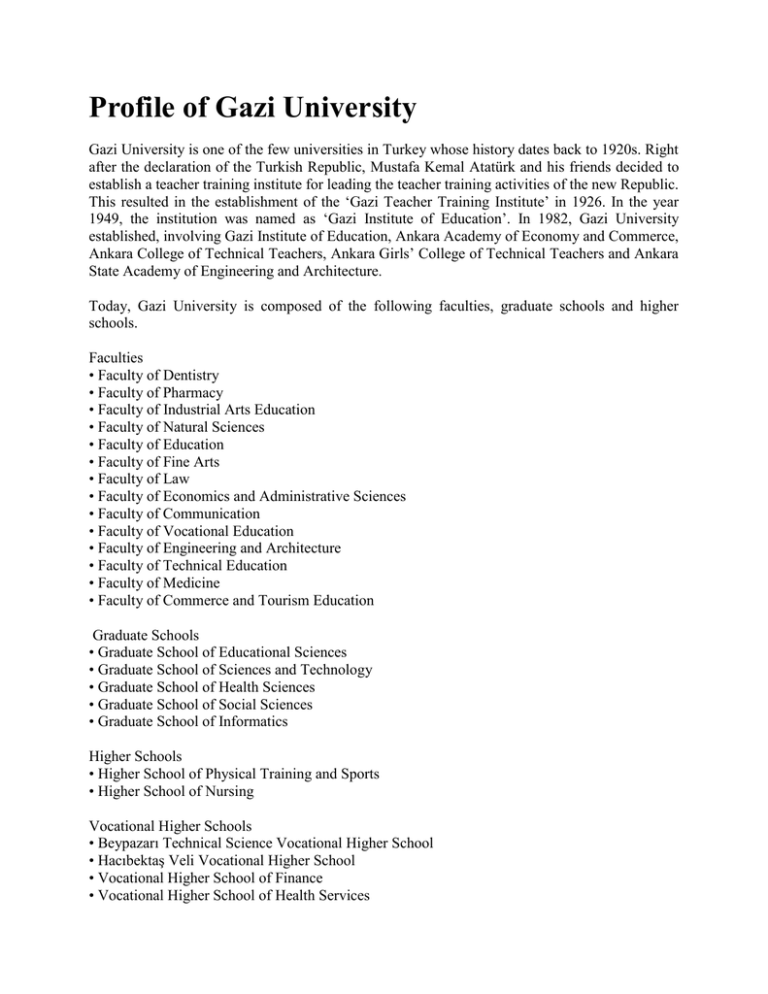
Profile of Gazi University Gazi University is one of the few universities in Turkey whose history dates back to 1920s. Right after the declaration of the Turkish Republic, Mustafa Kemal Atatürk and his friends decided to establish a teacher training institute for leading the teacher training activities of the new Republic. This resulted in the establishment of the ‘Gazi Teacher Training Institute’ in 1926. In the year 1949, the institution was named as ‘Gazi Institute of Education’. In 1982, Gazi University established, involving Gazi Institute of Education, Ankara Academy of Economy and Commerce, Ankara College of Technical Teachers, Ankara Girls’ College of Technical Teachers and Ankara State Academy of Engineering and Architecture. Today, Gazi University is composed of the following faculties, graduate schools and higher schools. Faculties • Faculty of Dentistry • Faculty of Pharmacy • Faculty of Industrial Arts Education • Faculty of Natural Sciences • Faculty of Education • Faculty of Fine Arts • Faculty of Law • Faculty of Economics and Administrative Sciences • Faculty of Communication • Faculty of Vocational Education • Faculty of Engineering and Architecture • Faculty of Technical Education • Faculty of Medicine • Faculty of Commerce and Tourism Education Graduate Schools • Graduate School of Educational Sciences • Graduate School of Sciences and Technology • Graduate School of Health Sciences • Graduate School of Social Sciences • Graduate School of Informatics Higher Schools • Higher School of Physical Training and Sports • Higher School of Nursing Vocational Higher Schools • Beypazarı Technical Science Vocational Higher School • Hacıbektaş Veli Vocational Higher School • Vocational Higher School of Finance • Vocational Higher School of Health Services • Atatürk Vocational Higher School • Ankara Vocational Higher School • Gazi Vocational Higher School GU is located at the centre and surroundings of Ankara and has multiple campuses. In the city centre, there are Teknikokullar, Beşevler, Emek, Maltepe campuses. Other campuses are located in the provinces of Gölbaşı, Çubuk, Akyurt and Beypazarı. In Teknikokullar campus (the main campus) Rectorship, executive units (student affairs, medical centre, cafeteria, centre for cultural activities, library, concert hall, sports centre, parking lot) and 4 faculties (Technical Education, Art and Sciences, Gazi Education, Pharmacy) and School of Nursery are spread on a wide area. In Beşevler campus, there are 3 faculties (Medicine, Vocational Education, Economics and Administrative Sciences) and the Graduate school of Informatics wheas in Emek campus there are 3 faculties (Dentistry, Law and Communication). In Maltepe campus Faculty of Engineering and Architecture, 3 graduate schools (Sciences and Technology, Social Sciences and Educational Sciences), Turkish Language Training Centre (TÖMER) are located. In Gölbaşı campus (20 km away from the main campus), Foreign Language Training Centre (YADEM), Faculty of Commerce and Tourism Education, Faculty of Industrial Arts Education, Nanotechnology Research Centre and TEKNOKENT (Technopolis) are located. In this Campus, there are also other central research laboratories, social facilities and sport areas for the students and the academic staff. More information about the facilities for the students can be obtained at: http://intoffice.gazi.edu.tr/?language=en_US Office of Student Affairs executes all student affairs centrally. Office of Health, Culture and Sports manages and meets nutrition, accommodation, social, cultural, health, scholarship and all other non – academic requirements of the students centrally. Turkish Language Training Centre (TÖMER) provides Turkish Language courses for the foreign students and Foreign Language Training Centre (YADEM) offers English courses in the preparatory classes as well as English and Professional English courses in the curriculum of the study programmes. As of 2007, there are 1564 teaching staff members (632 full time professors, 91 part time professors, 260 associate professors and 581 assistant professors), 341 lecturers, 184 instructors and 1322 research assistants in GU. Total number of students in associate’s, bachelor’s and postgraduate programmes is 57.107. Annual number of graduating students has reached 11.017 in 2006. From this perspective GU is one of the biggest universities in Turkey. GU, due to its position and mission, has functions beyond local and regional dimensions since its foundation. At the national level the university still continues to meet the teacher demand of Turkey and gives bachelor’s and post-graduate degree in health, natural, social and educational sciences in order to meet the national man power requirements. The university has educated many bureaucrats, politicians, important businessmen, famous media members, and artists in plastic arts, music and sportsmen within its structure that comprises different disciplines. GU is very decisive and ambitious in fulfilling the requirements of the Bologna Process to which Turkey became a party in 2001. The university started bilateral cooperation on student and academic staff mobility immediately after receiving Erasmus University Charter in 2004. The university also exhibits a great interest on EU Life Long Learning Programme. In 2005, European Universities Association (EUA) membership of Gazi University became active. And, the University got the Institutional Evaluation of EUA in 2007. All of the existing education programmes in different disciplines are of equal academic priority. Quality improvement of educational programmes by continuous updating according to progresses in national/international higher education, economic developments, requirements of the country and business world, employability of graduates etc. is encouraged. Engineering programmes are accredited by MÜDEK (Engineering Evaluation board), a national accreditation institution for engineering programmes. Faculty of Dentistry had an external evaluation from ADEE (European Association for Dental Education). The University has also taken concrete steps for the improvement of the university-industry relationship during the last years. Among them, the projects of “Modernisation of Vocational and Technical Education”, Strengthening the Vocational Education and Training System in Turkey – MEGEP and several Leonardo da Vinci projects aiming towards the improvement in vocational and technical education are the most important. The recent establishments of the relevant centres (Technology Development Centre – TEKMER, Technopolis – TEKNOKENT) are the concrete steps taken to carry out bachelor’s/post-graduate education and research activities together with the industry to be useful for the society. The University has also a IP Support Unit for orienting the scientific studies of the academic staff and students to be ended by a patent application or industrial design registry. As well as that, Gazi University has been involved in the recent project of EPO (European Patent Office) to establish and support Technology Transfer Offices (TTO) in seven European Universities. Thus, it will be the first State University in Turkey to establish a technology transfer office in its structure and will be able to license and commercialise the patented products of the academic staff and students not only at the University but in the whole region of Central Anatolia and other regions of Turkey. Gazi University considers Bologna Process as an important opportunity for the continuous improvement of educational programmes in terms of degree structure and learning outcomes and as a value that will increase the employability and mobility of graduates. For this reason GU strategic plan includes projects that will implement the basic elements of Bologna Process. Gazi University has reflected Bologna Process implementation to formal education programmes through regulation modifications. For all programmes, learning outcomes and the ECTS credits of these outcomes have been defined and the course definition forms including this information have been placed on the web sites of the academic units. University gives DS to all graduate students upon request. Quality assurance practices, a fundamental element of Bologna Process is being carried out intensively during the last years. The university advanced in these practices in a short period of time. Gazi University had the first place among Turkish universities as regards to projects supported by LdV Programme in the last four years. The amount of input from LdV projects to the university in 4 years time has been around 4 million Euros. It has bilateral agreements with more than 60 European Universities within the framework of Erasmus Programme and got around 390.000 Euros to implement the mobility within this programme. Three degree cycle has already been in use in GU, and a student by fulfilling the requirements can have 4 year bachelor’s degree, 2 year master’s degree and 4 year doctorate degree education consecutively. The University is implementing three cycle systems almost in all educational programs involved in the faculties. There are many comparable and easily readable programs among the faculties. ECTS and DS is implemented for all concerned programs in the faculties. Post-graduate programmes serve the demand of natural, health, social, educational sciences and informatics. All students with a bachelor’s degree who meet the required conditions can apply to master’s degree programmes. Certain rules and regulations are already present for those programmes. Students who enrol to a post-graduate programme take certain courses and study with a supervisor. The appointment of supervisors is bound to certain criteria and all stages of the thesis are credited. Restructuring of programmes has been run simultaneously with the goal of transition to student centred learning. For this reason, programmes now define their credits as ECTS and, course outcomes as learning outcomes. The learning outcomes and ECTS credits are published in the information package and distributed to students at the beginning of each semester. It can be also reached from the web sites of the university and the academic units.
